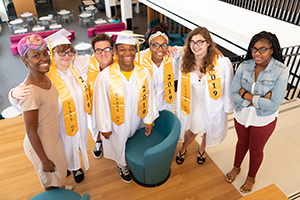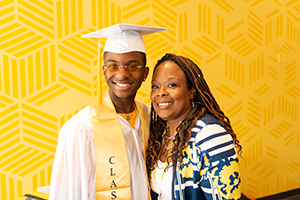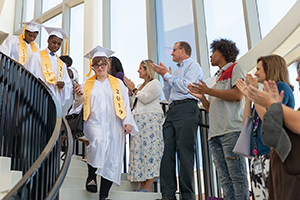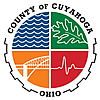Building Systems of Support for Teens Graduating After Foster Care
9/13/19
 We’re in the season when many students are heading back to school, or away to college. Many parents are helping them get prepared, buying school supplies or furnishing dorm rooms. But what about teens who do not have a family to support them because they are aging out of foster care? The Division of Children and Family Services tries to find a forever family for each child. However, when that’s not possible the agency is sensitive to the needs of teenagers preparing to become adults and the additional support and guidance they need.
We’re in the season when many students are heading back to school, or away to college. Many parents are helping them get prepared, buying school supplies or furnishing dorm rooms. But what about teens who do not have a family to support them because they are aging out of foster care? The Division of Children and Family Services tries to find a forever family for each child. However, when that’s not possible the agency is sensitive to the needs of teenagers preparing to become adults and the additional support and guidance they need.
 That’s why a special unit for Emancipation Services is tasked with working both internally and with community partners to find resources and support to help teens aging out of foster care. Along with a young person’s primary worker, emancipation workers offer another touchpoint that can help them navigate college visits and applications, finding work, housing, schools, and more. We want to make sure every teen leaves county care with a plan for stable housing, education and/or employment. This year DCFS celebrated 85 high school graduates and 8 college graduates.
That’s why a special unit for Emancipation Services is tasked with working both internally and with community partners to find resources and support to help teens aging out of foster care. Along with a young person’s primary worker, emancipation workers offer another touchpoint that can help them navigate college visits and applications, finding work, housing, schools, and more. We want to make sure every teen leaves county care with a plan for stable housing, education and/or employment. This year DCFS celebrated 85 high school graduates and 8 college graduates.
For teens who do not have a housing plan, staff works with various local landlords including the Cuyahoga Metropolitan Housing Authority to fast track housing applications within 90-120 days, under normal circumstances.
Teens who want to continue their education in college or trade school can get financial support if they are enrolled in school full-time through College Bound. DCFS also has partnerships with many of local colleges and universities that can specifically help teens get started on this path, along with lists of scholarship opportunities.
 A state program called Bridges is available for youth age 18 to 21 who have aged out of foster care in Ohio. The voluntary program provides coaching and monetary support for participants.
A state program called Bridges is available for youth age 18 to 21 who have aged out of foster care in Ohio. The voluntary program provides coaching and monetary support for participants.
Community partners also pitch in to help, such as members of Purple Umbrella. The purpose of the Purple Umbrella is to improve collaboration among Children Services agencies, adult serving agencies, faith-based community groups and the business community to better meet young persons’ needs. These businesses have a “purple umbrella” sticker in their window to let former foster youth know they are a place that understands their needs and wants to help.
 Finally, teens do not have to go it alone. Future Advocates and Leaders (FALyc) is a group for young adults and teens who have or are transitioning from care. They can socialize with other youth that understand their experiences, learn about resources, services and supports in the community, and build their voices to speak out for change. Meetings are held 1st & 3rd Mondays from 4:30—6:30pm.
Finally, teens do not have to go it alone. Future Advocates and Leaders (FALyc) is a group for young adults and teens who have or are transitioning from care. They can socialize with other youth that understand their experiences, learn about resources, services and supports in the community, and build their voices to speak out for change. Meetings are held 1st & 3rd Mondays from 4:30—6:30pm.
For more information about Emancipation services and support contact Danielle Green-Welch at 216-881-5786 or Danielle.Green-Welch@jfs.ohio.gov. Or you can call 216-696-KIDS and let them know you are a young person who has aged out of foster care and need some assistance.
Congratulations to our 2019 Graduates
by Deonna Kirkpatrick , Deputy Director for Communications, Department of Health and Human Services
 We’re in the season when many students are heading back to school, or away to college. Many parents are helping them get prepared, buying school supplies or furnishing dorm rooms. But what about teens who do not have a family to support them because they are aging out of foster care? The Division of Children and Family Services tries to find a forever family for each child. However, when that’s not possible the agency is sensitive to the needs of teenagers preparing to become adults and the additional support and guidance they need.
We’re in the season when many students are heading back to school, or away to college. Many parents are helping them get prepared, buying school supplies or furnishing dorm rooms. But what about teens who do not have a family to support them because they are aging out of foster care? The Division of Children and Family Services tries to find a forever family for each child. However, when that’s not possible the agency is sensitive to the needs of teenagers preparing to become adults and the additional support and guidance they need. That’s why a special unit for Emancipation Services is tasked with working both internally and with community partners to find resources and support to help teens aging out of foster care. Along with a young person’s primary worker, emancipation workers offer another touchpoint that can help them navigate college visits and applications, finding work, housing, schools, and more. We want to make sure every teen leaves county care with a plan for stable housing, education and/or employment. This year DCFS celebrated 85 high school graduates and 8 college graduates.
That’s why a special unit for Emancipation Services is tasked with working both internally and with community partners to find resources and support to help teens aging out of foster care. Along with a young person’s primary worker, emancipation workers offer another touchpoint that can help them navigate college visits and applications, finding work, housing, schools, and more. We want to make sure every teen leaves county care with a plan for stable housing, education and/or employment. This year DCFS celebrated 85 high school graduates and 8 college graduates.For teens who do not have a housing plan, staff works with various local landlords including the Cuyahoga Metropolitan Housing Authority to fast track housing applications within 90-120 days, under normal circumstances.
Teens who want to continue their education in college or trade school can get financial support if they are enrolled in school full-time through College Bound. DCFS also has partnerships with many of local colleges and universities that can specifically help teens get started on this path, along with lists of scholarship opportunities.
 A state program called Bridges is available for youth age 18 to 21 who have aged out of foster care in Ohio. The voluntary program provides coaching and monetary support for participants.
A state program called Bridges is available for youth age 18 to 21 who have aged out of foster care in Ohio. The voluntary program provides coaching and monetary support for participants.Community partners also pitch in to help, such as members of Purple Umbrella. The purpose of the Purple Umbrella is to improve collaboration among Children Services agencies, adult serving agencies, faith-based community groups and the business community to better meet young persons’ needs. These businesses have a “purple umbrella” sticker in their window to let former foster youth know they are a place that understands their needs and wants to help.
 Finally, teens do not have to go it alone. Future Advocates and Leaders (FALyc) is a group for young adults and teens who have or are transitioning from care. They can socialize with other youth that understand their experiences, learn about resources, services and supports in the community, and build their voices to speak out for change. Meetings are held 1st & 3rd Mondays from 4:30—6:30pm.
Finally, teens do not have to go it alone. Future Advocates and Leaders (FALyc) is a group for young adults and teens who have or are transitioning from care. They can socialize with other youth that understand their experiences, learn about resources, services and supports in the community, and build their voices to speak out for change. Meetings are held 1st & 3rd Mondays from 4:30—6:30pm.For more information about Emancipation services and support contact Danielle Green-Welch at 216-881-5786 or Danielle.Green-Welch@jfs.ohio.gov. Or you can call 216-696-KIDS and let them know you are a young person who has aged out of foster care and need some assistance.
Congratulations to our 2019 Graduates

